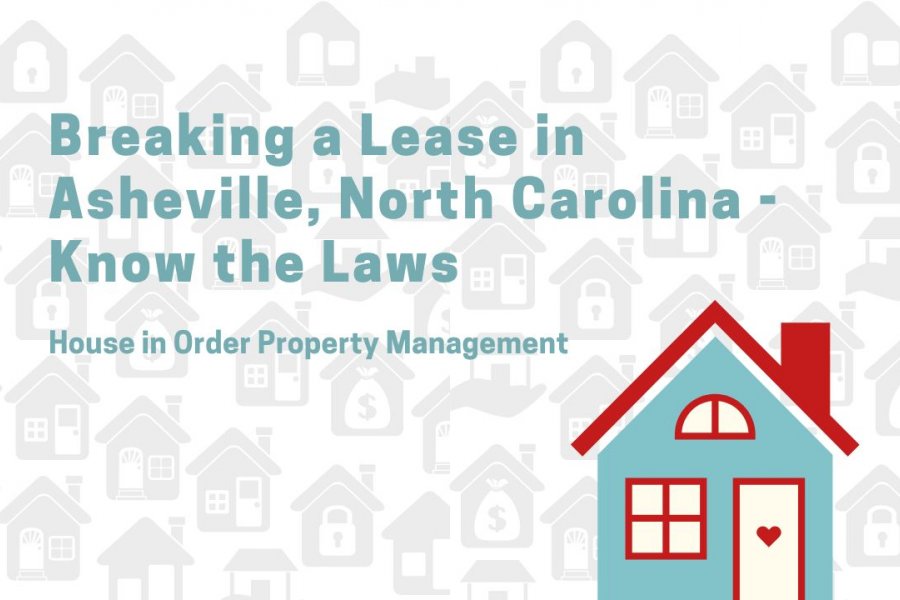
As a North Carolina landlord, knowing the regulations that dictate when tenants can break a lease early in North Carolina is essential to avoid problems later on.
With our experience as an Asheville rental company, we made this post to detail the justified and unjustified reasons for breaking a lease in North Carolina early. This information is crucial so that you understand your rights as a landlord, as well as your tenants’ rights.
North Carolina Lease or Rental Agreements
Drafting a detailed rental agreement is vital for your rental business. Before letting the tenants sign the lease agreement, it’s the landlords responsibility to explain its special rental provisions including the penalties for breaking a lease without a justifiable reason.
What’s more, under North Carolina law, tenants may be able to sublet the rental if it’s not clearly prohibited in the lease. A landlord may include a provision that requires renters to obtain your approval before they can sublet the rental unit. The tenant must write a request and send it through certified mail. The request should include:
- Sublet term
- Name and address of the prospective subtenant
- Reason for subletting
- Written consent of any co‑tenant, if applicable
- Copy of the proposed sublease
As a landlord, you may only reject the request to sublet for legitimate reasons.
Notice to Break Lease in North Carolina
As a North Carolina landlord, the lease agreement you write should state how much notice the tenant should give their landlord when looking to terminate their periodic lease in North Carolina.

The number of days of notice in North Carolina will depend on the term of the contract:
- Tenants who rent the property on a weekly basis should give their landlords a 2-day notice.
- A tenant who does monthly rent payments is required to notify the landlord at least 7 days prior.
- If the lease term is on a yearly basis with no end date, the written notice should be given at least one month before the end of the year of the current rental period.
It’s worth noting that for leases with a specific end date, renters are no longer required to provide a written notice to terminate the lease. If you’re renting out a manufactured home, renters are mandated to send at least 60 days' notice prior to the end of the lease period, no matter the lease term.
The rental agreement should also include the landlord’s responsibility to find a replacement tenant and re-rent the unit. North Carolina landlords aren’t liable or required to take reasonable efforts to find a replacement tenant and re-rent their vacant properties if renters break a lease early.
Unjustified Reasons for Breaking a Lease in North Carolina
If a tenant conducts an early termination clause for any of the reasons stated below, they will have no legal protections from penalties for not seeing the lease through:
- The tenant bought a new house and would like to move in before the end of their current lease
- The tenant is looking to upsize or downsize
- The tenant is moving for school or a new job opportunity
- The tenant wants to be closer to family
- The tenant wants to move in with a friend or partner

Ending the lease for these reasons, without gaining court approval can result in legal consequences for a tenant. If a tenant is breaking a lease for any of the listed reasons, the tenant can ask the landlord to agree to lease termination terms.
Justifiable Reasons for Breaking a Rental Lease in North Carolina
As a North Carolina landlord, you must know the justified reasons for renters to end a lease early. The following provides some legal justification as why a tenant would need to terminate a lease in North Carolina in accordance with landlord-tenant laws:
Early Termination Clause
A North Carolina landlord may include an early termination clause, which will allow the tenants to break the lease before the tenancy end date for a penalty fee. The provision should include the amount of the fee and the required notice period.
Active Military Duty
Renters starting active military duty during their tenancy can be allowed to legally terminate a lease if they are relocated due to deployment or a permanent change of station. Under the Servicemembers Civil Relief Act, renters are protected from getting penalized from the date they entered active duty up to 30 to 90 days after they are discharged.
Renters who are in active military service are required to prove that they entered the military before they signed the lease agreement. Also, the tenant needs to prove to the landlord that they will be on duty for at least 90 days. They should deliver a proper notice to the landlords with a copy of the orders to deploy or a letter signed by their commanding officer.

Unit is Uninhabitable
As a landlord, you should be aware of your responsibilities to provide a habitable rental property to your tenants. If a landlord violates any building, safety, and health codes, or if they fail to make the necessary maintenance and repairs within a reasonable timeframe, their tenants may claim that the rental property is not habitable which allows them to break the lease without being penalized.
Other Reasons
- Violation of Privacy: North Carolina landlords have the right to enter the premises as long as they do not violate their tenants’ privacy. While there is no statute about landlord entry under North Carolina rental laws, landlords are encouraged to provide at least 24 hours notice prior to entering the rental unit.
- Changing locks: In North Carolina, landlords are prohibited from changing the locks without their tenant's knowledge.
- Domestic Violence: A tenant who's a domestic violence victim and needs to move out of the rental unit for their protection may be allowed to break their lease.
Bottom Line
Landlords need to know the legally justified and unjustified reasons for renters to terminate their leases early. You should also stay up-to-date on North Carolina security deposit laws, the legal North Carolina eviction process, Fair Housing Laws, and rent increase policies.
If you have any questions regarding the North Carolina landlord-tenant law, contact House In Order Property Management at 828-484-1571 and we’ll be happy to serve you! We're an experienced property management company dedicated to helping rental property owners maximize their ROI through our property management company.
Disclaimer: This blog should not be used as a substitute for legal advice from a licensed attorney in your state. Laws change, and this post might not be updated at the time of your reading. Please contact us for any questions you have in regard to this content or any other aspect of your property management needs.
